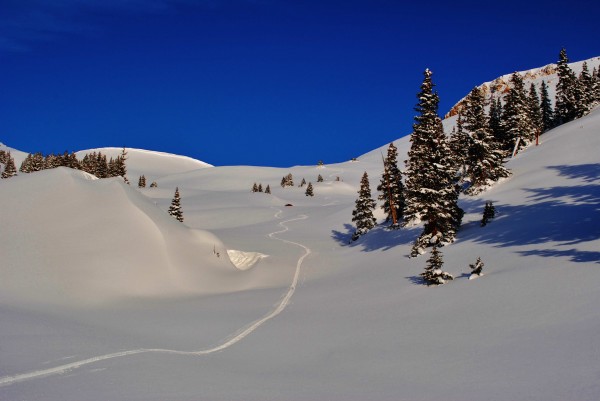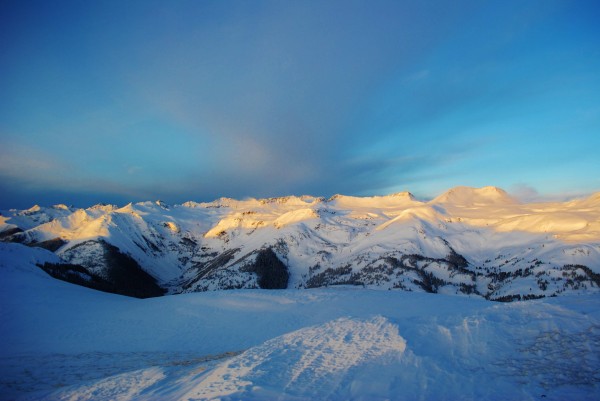
15 Mar Earth Matters: Searching for Silence in a Loud World
I’m alone, skiing towards a high ridge in the San Juan Mountains of Colorado. The stars are bright, but a slight glow is spreading from the east. Breath after breath creates a plume of steam that’s illuminated by my headlamp. My skis slide smoothly over the cold snow. Each step is slow and calculated. I have a full day ahead of me. It’s hard to maintain a slow pace; I’m ripe with the anticipation of sunrise.
I crest a ridge at 12,300 ft. and gaze towards the east. I’m breathing hard. There’s frost on my face and my feet are cold. I stomp to warm them up and realize the crunch of the snow under my boots is the only sound I hear. I stop for a moment, hold my breath, and listen in silence to the silence. The world seems to be holding its breath in anticipation of the coming day.
I’m beaming and extremely content. I take it all in. I’m free to expand my senses in all directions to infinity. The first rays of sun hit my closed eyes and I open them to a transformed world. The snow is sparkling and I feel the warmth. I’m completely present, totally captivated by where I am. After cresting the ridge, I strip off my climbing skins and swoosh down through the virgin snow. I’m carving my signature into one of the most beautiful landscapes on earth, uninterrupted by any human distraction. I spend the day in bliss.
Unfortunately, this type of experience is becoming harder and harder to find. Humans are impacting the environment much more intensely today than they did in the past. Very few places on earth remain untouched. The level of sound is one strong indication of just how widespread human pollution really is, particularly though not exclusively the artificial sound created by internal combustion engines, which seems to be everywhere on the planet.
As Kathaleen D. Moore states in her 2009 article, “Searching for Silence”: “If a quiet place is one where you can listen for 15 minutes in daylight hours without hearing a human-created sound, there are no quiet places left in Europe. There are none east of the Mississippi River. And in the American West? Maybe 12.”
The added noise is having negative effects both on ecosystems and on humans. Studies show that in high-noise environments, birds are changing the pitch of their calls to be heard by mates, or they’re calling louder. Species unable to adapt, are simply leaving those systems.
Humans aren’t invulnerable either: studies are showing a higher likelihood of heart disease caused by living in an area with loud traffic. There’s a less obvious consequence as well, and that’s the effect noise has on our ability to resonate with the natural environments we interact with.
How many times have you felt truly alone and “out there” only to be distracted by the roar of a jet cruising above you at 32,000 ft.? This pervasiveness of sound is furthering our disconnect with nature, making it more difficult to experience what the world might have been like before the industrial revolution.
Fortunately, people are waking up to this problem and solutions are forming. The National Park Service created a soundscape management plan which states, “The National Park Service will preserve, to the greatest extent possible, the natural soundscapes of parks. Natural soundscapes exist in the absence of human-caused sound. The Service will restore degraded soundscapes to the natural condition wherever possible, and will protect natural soundscapes from degradation due to noise”
Organizations such as onesquareinch.org are keeping the NPS to their word by attempting to create one square inch of Olympic National Park in Washington State completely devoid of human- created sound. It hasn’t been easy. Airlines that fly over the park en route to Alaska have been anything but compliant with changing their route to avoid disturbing the area.
Silence has given me the space to not only explore where I am, but to delve into core human queries like Who am I? It’s been a key factor affecting my growth as a person and it has helped shape how I view the world. Changing the way we view silence, from something to take for granted or fill with advertisements to a resource worth protecting is a key first step in reducing the noise we create as a society.
So next time you go out on a walk, get on your bike, or sit out on your back porch, tune into what you are hearing. Really take in the sounds and invite your friends to do the same.
Sounding off for silence is noise worth making.




Sorry, the comment form is closed at this time.